词类转译法Conversion
- 格式:pdf
- 大小:182.04 KB
- 文档页数:4


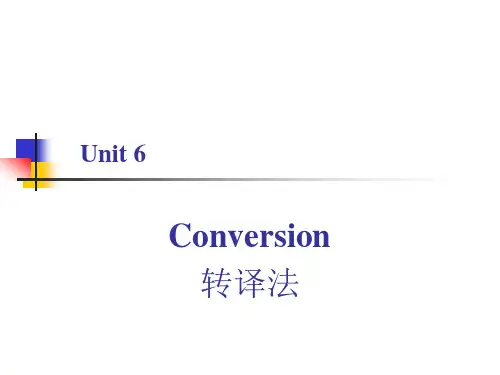
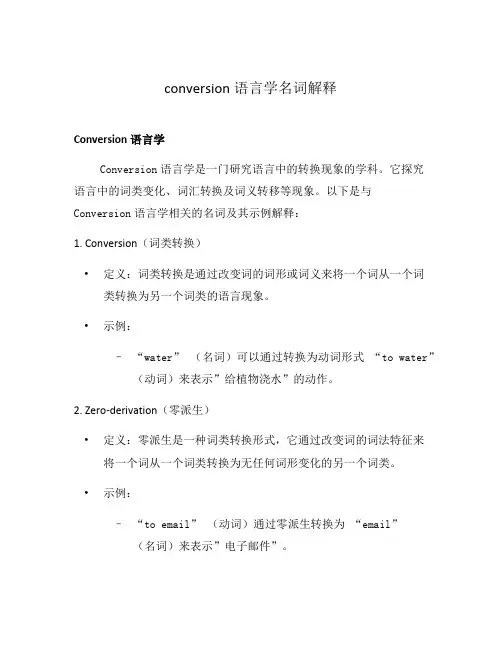
conversion语言学名词解释Conversion语言学Conversion语言学是一门研究语言中的转换现象的学科。
它探究语言中的词类变化、词汇转换及词义转移等现象。
以下是与Conversion语言学相关的名词及其示例解释:1. Conversion(词类转换)•定义:词类转换是通过改变词的词形或词义来将一个词从一个词类转换为另一个词类的语言现象。
•示例:–“water” (名词)可以通过转换为动词形式“to water”(动词)来表示”给植物浇水”的动作。
2. Zero-derivation(零派生)•定义:零派生是一种词类转换形式,它通过改变词的词法特征来将一个词从一个词类转换为无任何词形变化的另一个词类。
•示例:–“to email” (动词)通过零派生转换为“email”(名词)来表示”电子邮件”。
3. Back-formation(逆构词)•定义:逆构词是从某个词的派生词中移除词缀,从而形成一个新的词。
•示例:–“editor” (名词)通过逆构词转换为“edit” (动词)来表示”编辑”的动作。
4. Suppletion(替代派生)•定义:替代派生是一种通过改变词的词根或词干来进行词类转换的形式。
•示例:–“good” (形容词)通过替代派生转换为“the good”(名词)来表示”好的人或事物”。
5. Metonymy(转喻)•定义:转喻是一种通过语义转移将词从原本的意义转换为与其有关的其他意义的语言现象。
•示例:–“crown” (皇冠)通过转喻转换为“the monarchy”(君主制)来表示”国家的王权”。
6. Synecdoche(提喻)•定义:提喻是一种通过将一个词代表的整体改为代表其一部分,或者将代表一部分的词改为代表整体的语言现象。
•示例:–“bread” (面包)通过提喻转换为“food” (食物)来表示”食物的一种”。
7. Conversionalization(语言化)•定义:语言化是指将某个词或短语从其他语言借用并转换为与本土语言相适应的语言现象。


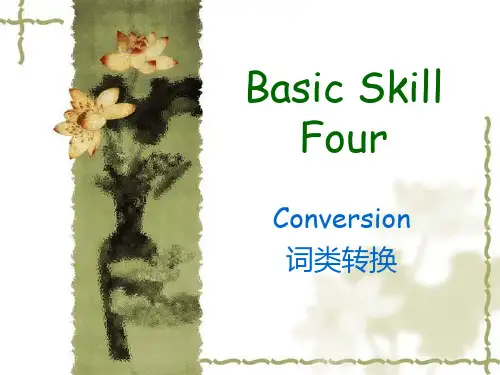
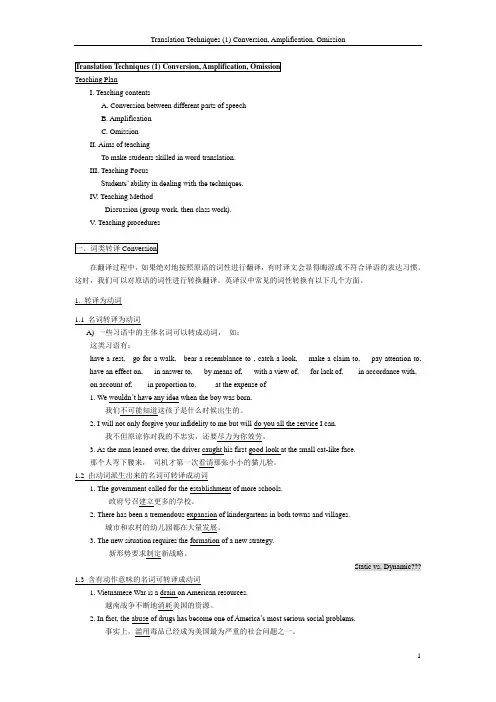
Teaching PlanI. Teaching contentsA. Conversion between different parts of speechB. AmplificationC. OmissionII. Aims of teachingTo make students skilled in word translation.III. Teaching FocusStudents’ ability in dealing with the techniques.IV. Teaching MethodDiscussion (group work, then class work).V. Teaching procedures在翻译过程中,如果绝对地按照原语的词性进行翻译,有时译文会显得晦涩或不符合译语的表达习惯。
这时,我们可以对原语的词性进行转换翻译。
英译汉中常见的词性转换有以下几个方面。
1. 转译为动词1.1 名词转译为动词A) 一些习语中的主体名词可以转成动词,如:这类习语有:have a rest, go for a walk, bear a resemblance to , catch a look, make a claim to, pay attention to, have an effect on, in answer to, by means of, with a view of, for lack of, in accordance with, on account of, in proportion to, at the expense of1. We wouldn’t have any idea when the boy was born.我们不可能知道这孩子是什么时候出生的。
2. I will not only forgive your infidelity to me but will do you all the service I can.我不但原谅你对我的不忠实,还要尽力为你效劳。


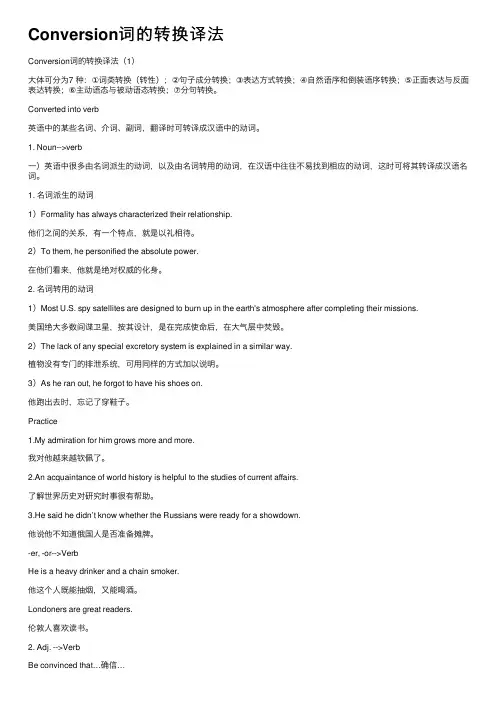
Conversion词的转换译法Conversion词的转换译法(1)⼤体可分为7 种:①词类转换(转性);②句⼦成分转换;③表达⽅式转换;④⾃然语序和倒装语序转换;⑤正⾯表达与反⾯表达转换;⑥主动语态与被动语态转换;⑦分句转换。
Converted into verb英语中的某些名词、介词、副词,翻译时可转译成汉语中的动词。
1. Noun-->verb⼀)英语中很多由名词派⽣的动词,以及由名词转⽤的动词,在汉语中往往不易找到相应的动词,这时可将其转译成汉语名词。
1. 名词派⽣的动词1)Formality has always characterized their relationship.他们之间的关系,有⼀个特点,就是以礼相待。
2)To them, he personified the absolute power.在他们看来,他就是绝对权威的化⾝。
2. 名词转⽤的动词1)Most U.S. spy satellites are designed to burn up in the earth's atmosphere after completing their missions.美国绝⼤多数间谍卫星,按其设计,是在完成使命后,在⼤⽓层中焚毁。
2)The lack of any special excretory system is explained in a similar way.植物没有专门的排泄系统,可⽤同样的⽅式加以说明。
3)As he ran out, he forgot to have his shoes on.他跑出去时,忘记了穿鞋⼦。
Practice1.My admiration for him grows more and more.我对他越来越钦佩了。
2.An acquaintance of world history is helpful to the studies of current affairs.了解世界历史对研究时事很有帮助。
翻译技巧4词类转译法英语与汉语的一个显著差异:英语呈静态;汉语呈动态从词汇用法上,英语中常用抽象名词、动词的同源名词、同源形容词、副词及介词等来表达动态含义。
而汉语的动词由于无形态变化,若要表示动作意义,往往只能采用动词。
Don’t believe him.You should know he is a good kidder.不要相信他。
你应该知道他很会骗人的。
I’m doubtful whether he is still alive.我怀疑他是否还活着。
Mother is on the telephone with father.母亲与父亲在通话。
一、词类的转译(一)英语名词的转译1.英语名词—〉汉语动词nominalization)成为英语使用中的普遍现象,构成了静态为主的语言特征。
而汉名词化(nominalization语是逻辑性语言,不受动词形态变化的约束,使用较多的动词,形成了明显的动态优势。
英译汉的过程就是在译文中强化原文动态色彩的过程,常常需要英语名词转换成汉语动词。
(1)具有动作意义的名词(action nouns)例1.I’m convinced that China’s WTO membership will do more contributions to the development of global economy.我坚信中国加入WTO将会对全球经济发展做出更大贡献。
例2.Parents’love of children is perfect and minute.(n.+of)父母爱子女无微不至。
English.(n.+of短语)例3.There is no shortcut to the mastery of English掌握英语无捷径。
(2)有些与感官动词(see,hear,think,know等)相联系的名词(sight,sound,glance,view, knowledge等)通常转译成动词。
"转换"、"转变"、"变换"、"革新"都可以翻译为conversion。
下面我会对这几种译法进行详细解释并举例说明:1. "转换":这是一个很通用的译法,通常用于表示将一种形式或状态转变为另一种形式或状态。
例如,我们可以说"将数据从一种格式转换为另一种格式"或者"将能源从一种形式转换为另一种形式"。
2. "转变":这个译法通常用于表示重大的、根本性的变化。
它强调的是从一个极端到另一个极端的转变,例如从贫穷到富裕,从消极到积极等。
3. "变换":这个译法强调的是在一定范围内或条件下的变化。
它可能是在同一性质或同一类别下的变化,例如在不同的季节或天气条件下,人们所穿的衣服会有所变换。
4. "革新":这个译法通常用于表示通过创新或改进而实现的变化。
它可能涉及到技术、方法、流程等方面的改变,例如新的生产方法、新的管理理念等。
在具体的使用场景中,这些译法可能会有所不同。
例如,如果涉及到物理设备的转换,我们可能会选择使用"转换"或"革新"。
如果涉及到商业或技术的改变,我们可能会选择"转变"或"变换"。
但是这些译法并非绝对,具体情况还需要根据上下文和语境来判断。
除此之外,还有"转译"、"转业"、"转型"、"转向"等说法,都可以表示某种变化或转变,但具体含义可能会因语境而异,需要具体分析。
以上是对conversion的各种译法的解释和举例,希望对你有所帮助。
汉英翻译技巧之词类转换法ConversionConversion: Conversion is also a common practice in Chinese-English translation. It is to change the part of speech into another.1. Verbs to be converted into Nouns.1) 林则徐认为,要成功地制止鸦片买卖,就得首先把鸦片销毁。
Lin Zexu believed that a successful of the trade in opium should be preceded by a of the drug itself.2) 邓小平在“十一大”上说:“一定要少说空话,多做工作”。
Deng Xiaoping said at the 11th Party Congress,“There must be and .” (v.--n.)3) 绝对不许违反这个原则。
No of this principle can be tolerated. (v.—n.)4)采用这种新装置可以大大降低废品率。
The of this new device will greatly cut down/reduce the percentage of defective products.5) 他在讲话中特别强调提高产品质量。
He raising the quality of products in his speech.6) 中国人民百年以来不屈不挠、再接再厉地英勇斗争,使得帝国主义至今不能灭亡中国,也永远不能灭亡中国。
Thanks to the Chinese people’s unrelenting and heroic during the last hundred years, imperialism has not been able to conquer/subjugate/disintegrate China, nor will it ever be able to do so.7) 他们一不会做工,二不会种地,三不会打仗。
中高级口译翻译技巧:转译ConversionConversion英语属印欧语系,汉语属藏族语系。
英汉两种语言在词汇和语法结构方面有许多不同,在大多数情况下英译汉时很难将两种语言的词汇和结构一一对应。
为了使译文符合汉语习惯,翻译时不必拘泥于原文表层结构,可以在忠实原文意义的前提下将原文中某些词的词类成分转换为汉语的其他词类或成分。
(1)N. - V.1)由动词派生的名词2)具有动作意味的名词3)以-er结尾的名词1. The employers called for the establishment of more vocational schools.雇主呼吁建立更多的职校。
vocation: (自己非常热爱的)职业【与Job的区别】Teaching isn’t just a job, it’s a vocation. 教书并不单单是一份工作,它是一种职业。
has a vocation for 有从事某种行业的天赋He has a vocation for teaching. 他有教书的天赋。
vocational schools 职校?technical schools 技校2.The sight and sound of our jet planes make me feel excited.看到我们的喷气式飞机,听到隆隆的轰鸣声,让我兴奋不已。
glance/at the mention of /3.He is a good speaker. His eloquence makes a name for him.他能言善变,他的口才造就了他的名声。
teacher/flyer/trouble-maker/eloquence: 口才 adj. eloquent 雄辩的make a name for 早就名声 make a name for yourself/make your nameExercises I:1. Don’t give me the runaround. Just tell me if you would marry me or notrunaround n. 搪塞,回避give sb the runaround (当别人要你做某事时)搪塞,顾左右而言他不要搪塞我,告诉我你到底愿不愿意嫁给我。
翻译技巧4词类转译法英语与汉语的一个显著差异:英语呈静态;汉语呈动态从词汇用法上,英语中常用抽象名词、动词的同源名词、同源形容词、副词及介词等来表达动态含义。
而汉语的动词由于无形态变化,若要表示动作意义,往往只能采用动词。
Don’t believe him.You should know he is a good kidder.不要相信他。
你应该知道他很会骗人的。
I’m doubtful whether he is still alive.我怀疑他是否还活着。
Mother is on the telephone with father.母亲与父亲在通话。
一、词类的转译(一)英语名词的转译1.英语名词—〉汉语动词nominalization)成为英语使用中的普遍现象,构成了静态为主的语言特征。
而汉名词化(nominalization语是逻辑性语言,不受动词形态变化的约束,使用较多的动词,形成了明显的动态优势。
英译汉的过程就是在译文中强化原文动态色彩的过程,常常需要英语名词转换成汉语动词。
(1)具有动作意义的名词(action nouns)例1.I’m convinced that China’s WTO membership will do more contributions to the development of global economy.我坚信中国加入WTO将会对全球经济发展做出更大贡献。
例2.Parents’love of children is perfect and minute.(n.+of)父母爱子女无微不至。
English.(n.+of短语)例3.There is no shortcut to the mastery of English掌握英语无捷径。
(2)有些与感官动词(see,hear,think,know等)相联系的名词(sight,sound,glance,view, knowledge等)通常转译成动词。
例1.The sight and sound of our jet planes filled me with special longing.看到我们的喷气式飞机,听到隆隆的机声,我的心里充满特别的向往之情。
例2.Some knowledge about the structure and history of Chinese is helpful for the study of the language.了解一下汉字的结构和发展史,对学习汉语是有帮助的。
(3)某些由动词作词根+er/or构成的名词,当它不表示个人的职业,而具有较强的动作意义时,可将其转译为动词。
例1.Professor Wang was the instructor of our experiment.王教授指导我们做实验。
例2.He is a good eater and a good sleepersleeper.他能吃能睡。
例3.Those photos served as a reminder of my childhood.那些照片使我想起了童年。
例4.I am afraid I can’t teach you swimming.I think my little brother is a better teacher than I.恐怕我不能教你游泳。
我想我的小弟弟比我教得更好。
(4)构成动词短语的中心名词have a look,have a glance at,have a love for,take care of,take notice of,pay attention to,make use of,give approval to等例1.He had a good knowledge of chemistry.他精通化学。
stop.例2.Please don’t get on or off the bus before it comes to a full stop在车没有完全停稳之前,请不要上下车。
(5)由弱化的动词结构there be+名词也能表达动态含义As Shanghai becomes increasingly congested and polluted,there has been a growing realization that action is needed to tackle these problems.随着上海变得越来越拥挤,污染问题日益严重,人们更加意识到需要采取行动来解决这些问题。
2.英语名词—〉汉语的形容词形容词派生来的名词例1.We are deeply convinced of the correctness of this policy and firmly determined to pursue it.我们深信这一政策是正确的,并决定继续奉行这一政策。
例2.Australian guests are immensely impressed by the splendor and warmth of our reception at the airport.澳大利亚客人对于我们在机场所给予的盛大热情的接待,深表感谢。
3.英语名词—〉汉语的副词The delegates at the conference unanimously expressed their determination to oppose hegemonism on the part of the two superpowers.会上,代表们一致表示坚决地反对两个超级大国的霸权主义。
(二)英语形容词的转译1.英语形容词—〉汉语的动词(1)由动词派生来的形容词,尤其以-able,-ible为后缀的形容词动作意义明显work---workableavail---availableconvert---convertibleapply---applicabledispose---disposable这类形容词使用频率高,能贴切地体现出汉语的动词意义.。
译为“可……”,“适合…..”dismissible,so don’t take it to heart.她的话无足轻重,不要太往心里去。
例1What she said is dismissible不相容。
Water is incompatible with fire.例2水火不相容例3The State Department’s top-ranking Asian specialist said Monday that China’s opening to the West is a helpful policy that should be encouraged by close ties with the United States.国务院最高级的亚洲问题专家星期一说,中国向西方开放的政策是一项好政策,应该通过加强中国同美国的关系来加以鼓励。
(2)表示心理活动和状态的形容词(confident,certain,angry,aware,optimistic,anxious,guilty, delighted,reluctant等)例1.Doctors have said that they are not sure they can save his life.医生们说他们不敢肯定能否救得了他的命。
持乐观的态度。
例2.对中美关系的未来我持乐观的态度I’m very optimistic about the future development of Sino-US relations.(3)以-ed,-ing结尾的形容词常与be动词或其他弱化动词连用,具有明显的动态特征excited/enlightening/pushing/relieved/determined/rewarding/embarrassing/well-intentioned等松了一口气。
例1知道他已经安全地到达美国,我终于松了一口气Knowing that he had arrived in the US safely,I was greatly relieved.例2Saud was a frustrated man at that time.沙特那时已受挫折。
2.英语形容词—〉汉语的名词hypocritical.我们大家认为他是一个十足的伪君子。
例1.Most of us think him very hypocriticalflexible,and can do a greater variety of jobs.例2Computers are more flexible计算机的灵活性较大,因此,能做更多不同的工作。
3.英语形容词—〉汉语的副词例1.There is a big increase in demand for all kinds of consumer goods in every part of our country.目前,我国各地对各种消费品的需求已大大增加。
例2She was concentrating herself too thoroughly---what she did really required less mental andphysical strain.她的注意力集中得过分了——她做这工作,精神上肉体上都用不着那样紧张的。
例3.We must make full use of the natural resources available.我们应当充分利用现有的自然资源。
(三)英语动词的转译1.英语动词—〉汉语的名词例1.Quick decision characterized him.当机立断是他的特点。
例2.Our age is witnessing a profound political change.我们的时代是深刻的政治变化的见证。
例3.Gases differ from solids in that the former have greater compressibility than the latter.气体和固体的区别在于气体的可压缩性比固体的大。
2.英语动词—〉汉语的副词例Underground water reserves are much larger than those on the surface,but as they are unseen we tend to underestimate them.地下水的储量比地表水大得多,但是由于看不见,人们往往会低估地下水的储量。